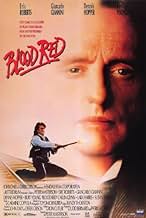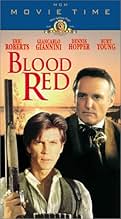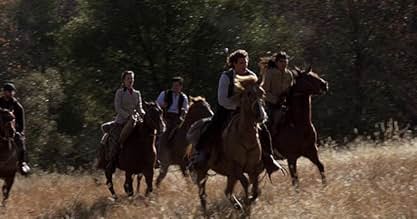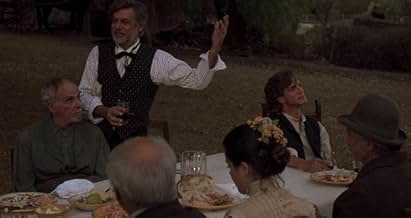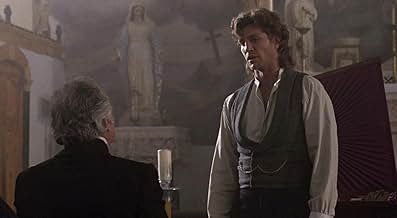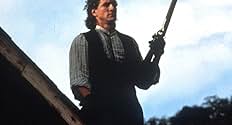IMDb-BEWERTUNG
4,1/10
1062
IHRE BEWERTUNG
Im Kalifornien des 19. Jahrhunderts gerät eine sizilianische Winzerfamilie ins Visier eines korrupten Eisenbahnmagnaten, nachdem sie sich geweigert hat, ihr Land zu verlassen.Im Kalifornien des 19. Jahrhunderts gerät eine sizilianische Winzerfamilie ins Visier eines korrupten Eisenbahnmagnaten, nachdem sie sich geweigert hat, ihr Land zu verlassen.Im Kalifornien des 19. Jahrhunderts gerät eine sizilianische Winzerfamilie ins Visier eines korrupten Eisenbahnmagnaten, nachdem sie sich geweigert hat, ihr Land zu verlassen.
Joseph Runningfox
- Samuel Joseph
- (as Joseph Running Fox)
Empfohlene Bewertungen
This was obviously a low budget film. It shows in every scene. What is nice to see is where it was made. A lot of the film was shot in Columbia, CA, in the Sierra Nevada Mountains near Sonora, CA. Some of the film was also shot in Jamestown, CA, very near Columbia. There is a railroad museum in Jamestown and they used some of the old trains in the picture. "High Noon" was also shot in Jamestown, as was "Back to the Future III".
My review was written in April 1990 after watching the movie on Nelson Entertainment video cassette.
"Blood Red", a saga of oppressed Sicilian winegrowers in 19th century California, is an unsuccessful throwback to earlier forms of filmmaking. First-time screen teaming of siblings Eric and Julia Roberts makes this a definite curiosity item.
Project was announced in 1976 by producer Judd Bernard, filmed in 1986 and given a pefunctory release last summer by Hemdale.
Future film historians will ponder why this wasn't a Paramount picture, since it conforms to the themes and mood of "The Godfather", "1900" and Eric Roberts' first staring pic, "The King of the Gypsies". All that's missing is the late Sterling Hayden.
A robust Giancarlo Giannini is patriarch of one ot two families in Brandon, California, and soon is warring with robber baron railroad magnate Dennis Hopper (fitted with an unconvincing Scottish brogue here determined to get his land for his railroad's right of way.
Giannini's rebellious son, Eric Roberts, is in love with the beautiful daughter (Lara Harris) of another winegrowing clan. Hopper hires Burt Young (miscast) and his gang of mercenaries to convince Giannini and the other growers to clear out, resulting in violence. Pic ends in boring fashon with a whimper.
Ron Cutler's utterly predictable script is mainly to blame for draining "Blood Red" of interest. It emerges as a depiction in black hat/white hat terms of history in the mode of "Heaven's Gate" but without that film's controversial (but awesome) production values. Peter Masterson's direction is flat, and though there are some pretty shots, the love of the land and specifics of winegrowing are not developed.
Eric Roberts is more subdued than usual as the script fails to develop a three-dimensional character for him. His scenes with real-life sister Julia, cast as his sister, are intriguing because of the visual match. She doesn't get much chance to emote, but that nascent star quality already is evident.
Alexandra Masterson is a good match as the third sibling, while helmer's wife, Carlin Glynn (previously featured in Masterson's "The Trip to Bountiful") is solid representing the local gentry in supporting the Sicilan's just cause.
Carmine Coppola delives a romantic musical background that underscores the genre connection.
"Blood Red", a saga of oppressed Sicilian winegrowers in 19th century California, is an unsuccessful throwback to earlier forms of filmmaking. First-time screen teaming of siblings Eric and Julia Roberts makes this a definite curiosity item.
Project was announced in 1976 by producer Judd Bernard, filmed in 1986 and given a pefunctory release last summer by Hemdale.
Future film historians will ponder why this wasn't a Paramount picture, since it conforms to the themes and mood of "The Godfather", "1900" and Eric Roberts' first staring pic, "The King of the Gypsies". All that's missing is the late Sterling Hayden.
A robust Giancarlo Giannini is patriarch of one ot two families in Brandon, California, and soon is warring with robber baron railroad magnate Dennis Hopper (fitted with an unconvincing Scottish brogue here determined to get his land for his railroad's right of way.
Giannini's rebellious son, Eric Roberts, is in love with the beautiful daughter (Lara Harris) of another winegrowing clan. Hopper hires Burt Young (miscast) and his gang of mercenaries to convince Giannini and the other growers to clear out, resulting in violence. Pic ends in boring fashon with a whimper.
Ron Cutler's utterly predictable script is mainly to blame for draining "Blood Red" of interest. It emerges as a depiction in black hat/white hat terms of history in the mode of "Heaven's Gate" but without that film's controversial (but awesome) production values. Peter Masterson's direction is flat, and though there are some pretty shots, the love of the land and specifics of winegrowing are not developed.
Eric Roberts is more subdued than usual as the script fails to develop a three-dimensional character for him. His scenes with real-life sister Julia, cast as his sister, are intriguing because of the visual match. She doesn't get much chance to emote, but that nascent star quality already is evident.
Alexandra Masterson is a good match as the third sibling, while helmer's wife, Carlin Glynn (previously featured in Masterson's "The Trip to Bountiful") is solid representing the local gentry in supporting the Sicilan's just cause.
Carmine Coppola delives a romantic musical background that underscores the genre connection.
I'm not specifically familiar with filmmaker Peter Masterson or screenwriter Ron Cutler, but that's no specific indicator of quality. It's a considerable cast of very recognizable names that was assembled for this period piece. The very premise sounds enticing. Why have I never especially heard of this title before? Why does it seem to have had such a poor reception? Maybe it's because this is an independently produced feature without the benefits of major backing or wide release; then again, the involvement of so large a cast says otherwise, and a Coppola (Carmine) composing the score is no small get. Maybe it's because the ideas and themes herein - family, immigration, legacy, the individual versus large corporations, the inexorable march of industry and development no matter the cost, corruption, and more, all at the turn of the century - is a panoply more fitting for a protracted TV miniseries (a la 'North and south'), and this is a 90-minute standalone film. The latter facet begins to zero in a little more on the truth, I think, for while nothing about this is necessarily outright bad, small weaknesses rear their head all throughout the length, and at least in part it stems from the proceedings being shortchanged. 'Blood red' tells a compelling story, but it feels like only a fraction of the whole story being regrettably compressed.
Perhaps the cast recognized this in the screenplay, or in the nature of the contract they signed - that the characters they would be portraying wouldn't be as fully fleshed out as they could or should be. Maybe that's why, despite all their best efforts, sometimes it seems like the actors are a little uncomfortable and out of sorts in a scene, like they just can't quite get a grasp on the whole affair. A lot of plot happens even within just the first third, and every scene and major beat to greet us feels like it's given a fraction of the attention and import that it deserves. I understand why longer miniseries don't necessarily appeal to all comers, and I readily admit that I personally prefer singular features over any extended episode by episode storytelling, yet it seems readily apparent that the saga Cutler penned needed far greater breadth to explore all the possible depth and complexity. Incidentally, a fair point of reference in terms of narrative scope and content may be the 'Godfather' films of the composer's son; imagine what those would have looked like were they in any way abbreviated, and one begins to understand the chief problem with 'Blood red.' The scene writing suffers in turn, and the dialogue, and so on down the line.
In most every other way I think this is actually pretty well done. The cast did as well as they could, I think; the crew put in fantastic work. The filming locations are gorgeous, and the production design and art direction are superb. The costume design, hair, and makeup are splendid, and the props, all helping to visualize a particular place at a particular time. The stunts and effects are excellent. Coppola's score is highly enjoyable. I find no significant fault with the cinematography, or Masterson's direction. All this is well and good; it's unfortunate that all the potential richness of the tale is shrunk down into a fragment of what it could and should have been. From start to finish what detail and nuance there may have been in the plot is reduced to a notably smaller amount of emphatic items that are much more blunt and forthright as they present, largely stripped of the best value. As one critical, glaring example, see a scene shortly after the two-thirds mark, which for all the gravity it should have possessed instead just comes across as empty, flailing raised voices. I still think the final end result is entertaining, engaging, and worthwhile, but "satisfying" or "rewarding" are words that are much more difficult to meaningfully apply.
I see what this tried to be, and I commend the effort. Whatever the reason was for this precise realization, however - lack of resources, lack of vision, anything else - when all is said and done the picture is just casually disappointing. All its star power, and all the hard work of those behind the scenes, can only go so far when the necessary minutiae that would lend to the weight and impact of the storytelling are so heavily diminished if not outright omitted. Frankly, I would very much like to see another filmmaker take up Cutler's screenplay, and expand upon it to give it the treatment it deserves. The sad fact remains that even at its best 1989's 'Blood red' is a shade of the film it might have been, and it's hard to speak of it as any more than a soft recommendation. Whether you're a fan of this period in history, and all it entails, or of those involved, it's still worth checking out, but keep your expectations in check and don't go out of your way for it.
Perhaps the cast recognized this in the screenplay, or in the nature of the contract they signed - that the characters they would be portraying wouldn't be as fully fleshed out as they could or should be. Maybe that's why, despite all their best efforts, sometimes it seems like the actors are a little uncomfortable and out of sorts in a scene, like they just can't quite get a grasp on the whole affair. A lot of plot happens even within just the first third, and every scene and major beat to greet us feels like it's given a fraction of the attention and import that it deserves. I understand why longer miniseries don't necessarily appeal to all comers, and I readily admit that I personally prefer singular features over any extended episode by episode storytelling, yet it seems readily apparent that the saga Cutler penned needed far greater breadth to explore all the possible depth and complexity. Incidentally, a fair point of reference in terms of narrative scope and content may be the 'Godfather' films of the composer's son; imagine what those would have looked like were they in any way abbreviated, and one begins to understand the chief problem with 'Blood red.' The scene writing suffers in turn, and the dialogue, and so on down the line.
In most every other way I think this is actually pretty well done. The cast did as well as they could, I think; the crew put in fantastic work. The filming locations are gorgeous, and the production design and art direction are superb. The costume design, hair, and makeup are splendid, and the props, all helping to visualize a particular place at a particular time. The stunts and effects are excellent. Coppola's score is highly enjoyable. I find no significant fault with the cinematography, or Masterson's direction. All this is well and good; it's unfortunate that all the potential richness of the tale is shrunk down into a fragment of what it could and should have been. From start to finish what detail and nuance there may have been in the plot is reduced to a notably smaller amount of emphatic items that are much more blunt and forthright as they present, largely stripped of the best value. As one critical, glaring example, see a scene shortly after the two-thirds mark, which for all the gravity it should have possessed instead just comes across as empty, flailing raised voices. I still think the final end result is entertaining, engaging, and worthwhile, but "satisfying" or "rewarding" are words that are much more difficult to meaningfully apply.
I see what this tried to be, and I commend the effort. Whatever the reason was for this precise realization, however - lack of resources, lack of vision, anything else - when all is said and done the picture is just casually disappointing. All its star power, and all the hard work of those behind the scenes, can only go so far when the necessary minutiae that would lend to the weight and impact of the storytelling are so heavily diminished if not outright omitted. Frankly, I would very much like to see another filmmaker take up Cutler's screenplay, and expand upon it to give it the treatment it deserves. The sad fact remains that even at its best 1989's 'Blood red' is a shade of the film it might have been, and it's hard to speak of it as any more than a soft recommendation. Whether you're a fan of this period in history, and all it entails, or of those involved, it's still worth checking out, but keep your expectations in check and don't go out of your way for it.
This is a very good movie. It is well done in all respects. It is a good script with good casting. It is a delight to see the two Roberts together even though Julia has a very small role. IF you like good old fashioned tales about good and evil, good guys and bad guys, crooks and decent people, you will love this movie. Dennis hopper does what he does best, play a mean and nasty person - in this case, the railroad baron. Eric Roberts takes on the role of hero and fills that role very well. He is forced into his heroic stance by circumstance not by choice, making it all the more entertaining. This movie has it all, a villain, crooked politicians, good politicians, betrayal, a love story, little guys against giants, people fighting for their land and homes, what more could you want. Fix yourself some popcorn, turn out the lights, sit back and allow yourself to be entertained in classic fashion. This movie does what all movies should do no political agenda, no great moral it is just good, old fashioned entertainment.
This is playing On-Demand and is presented in its original 1.85:1 aspect ratio for the first time on home video.
The Good: The acting talent speaks for itself: Eric and Julia Roberts, Burt Young, Giancarlo Giannini, Elias Koteas, Michael Madsen... The cinematography by Toyomichi Kurita is beautiful. Themes: Late 19th century California, the beginning of wine culture, immigrant vs. business interests, William Jennings Bryan populism vs robber baron statism. All the tools are there for a great film.
The Bad: The screenplay is the problem. It needed a page one rewrite from someone who could write dialogue, and who could write scenes to emphasize the political, religious, and economic issues of the period. The characterization is almost non existent, with only Giannini's part getting some depth. There is so much wasted talented in this film. Usually Eric Roberts is criticized for overacting, but this picture could have definitely benefited from his passion. Also the music by Carmine Coppola is so old-fashioned and silly that it borders on soap opera cues.
The first half will keep your attention. After that, it becomes boring. Bad dialogue, bad music, and pedestrian mise-en-scene kill the movie. I was actually rewriting the scenes in my head as I was watching the film.
The Good: The acting talent speaks for itself: Eric and Julia Roberts, Burt Young, Giancarlo Giannini, Elias Koteas, Michael Madsen... The cinematography by Toyomichi Kurita is beautiful. Themes: Late 19th century California, the beginning of wine culture, immigrant vs. business interests, William Jennings Bryan populism vs robber baron statism. All the tools are there for a great film.
The Bad: The screenplay is the problem. It needed a page one rewrite from someone who could write dialogue, and who could write scenes to emphasize the political, religious, and economic issues of the period. The characterization is almost non existent, with only Giannini's part getting some depth. There is so much wasted talented in this film. Usually Eric Roberts is criticized for overacting, but this picture could have definitely benefited from his passion. Also the music by Carmine Coppola is so old-fashioned and silly that it borders on soap opera cues.
The first half will keep your attention. After that, it becomes boring. Bad dialogue, bad music, and pedestrian mise-en-scene kill the movie. I was actually rewriting the scenes in my head as I was watching the film.
Wusstest du schon
- WissenswertesOnly movie to feature siblings Eric Roberts and Julia Roberts (playing brother and sister).
Top-Auswahl
Melde dich zum Bewerten an und greife auf die Watchlist für personalisierte Empfehlungen zu.
- How long is Blood Red?Powered by Alexa
Details
- Erscheinungsdatum
- Herkunftsländer
- Sprache
- Auch bekannt als
- Blood Red
- Drehorte
- Columbia State Historic Park, 11255 Jackson Street, Columbia, Kalifornien, USA(Town, Church, Schoolhouse)
- Produktionsfirmen
- Weitere beteiligte Unternehmen bei IMDbPro anzeigen
Box Office
- Bruttoertrag in den USA und Kanada
- 15.510 $
- Weltweiter Bruttoertrag
- 15.510 $
Zu dieser Seite beitragen
Bearbeitung vorschlagen oder fehlenden Inhalt hinzufügen

Oberste Lücke
By what name was Blood Red - Stirb für Dein Land (1989) officially released in India in English?
Antwort

